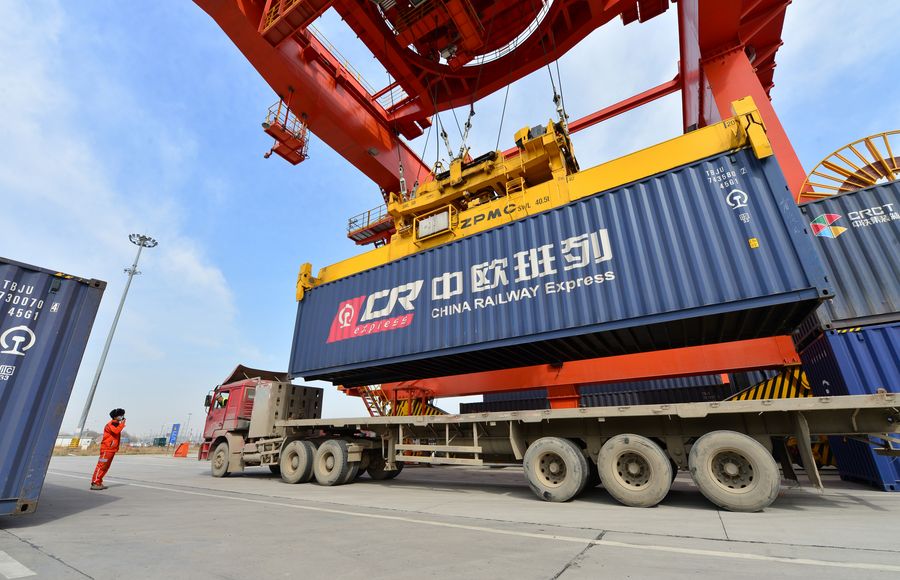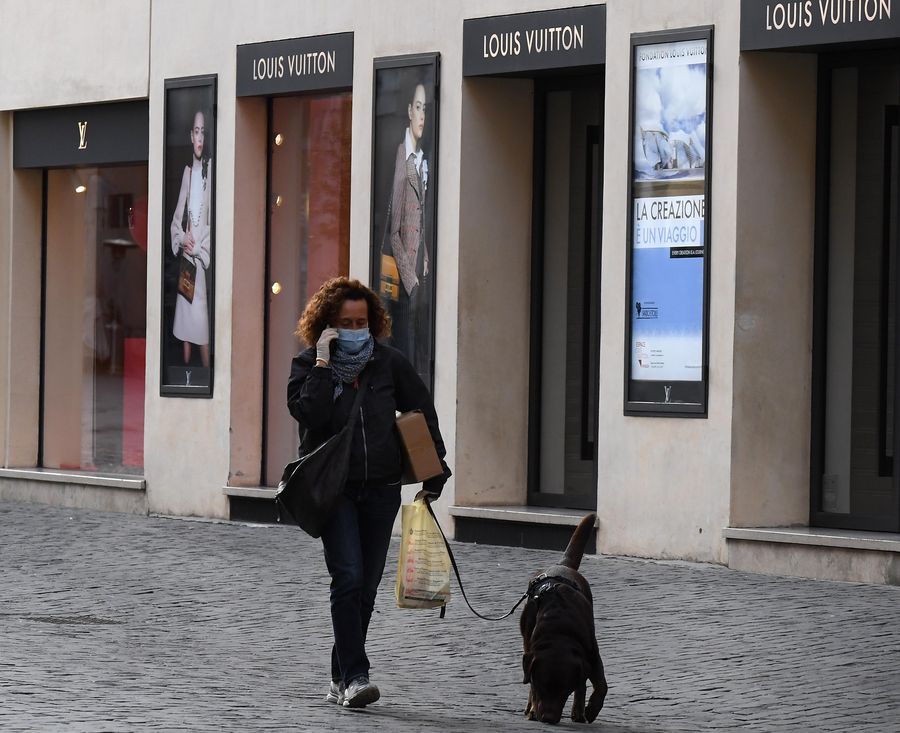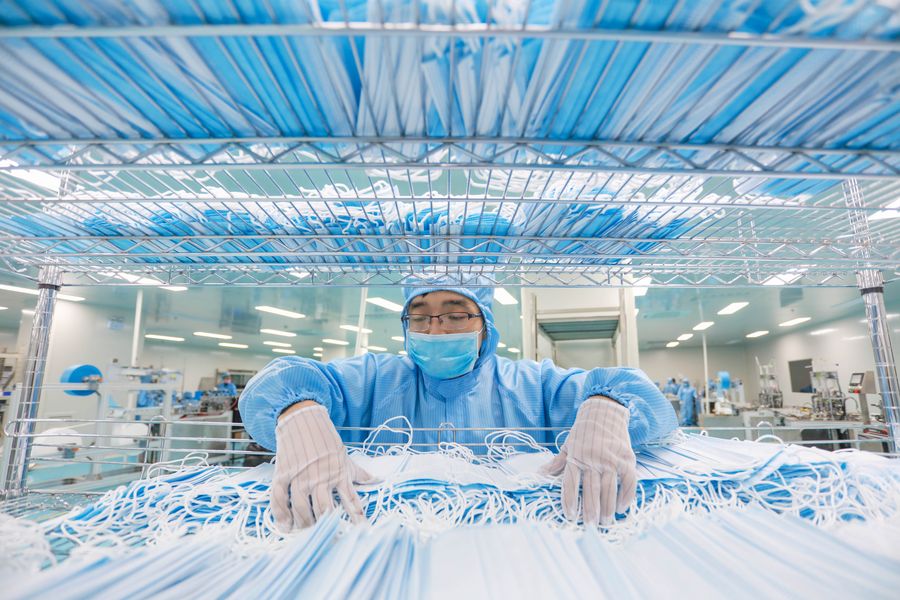Work resumption in China raises hope for virus-hit European economies
As COVID-19 continues to spread across Europe, the epidemic is starting to take its toll on European economy. Meanwhile, production resumption in China provides promising outlook due to its economic resilience.
As the new virus is going on the rampage worldwide, the European continent has started to feel the toll the novel coronavirus has taken on its economy.
In major economies such as Germany, France, Britain and Italy, economic outlook seems to have become grim as people fear for disruptions in supply chains and volatility in markets.
Nonetheless, many businesses sound a positive note as more and more Chinese workers have been back to factories, and enterprises, including foreign-funded ones, have resumed operation.

A worker directs container hoisting operation of a China-Europe freight train at a logistic station in Xinzhu Railway Station in Xi'an, northwest China's Shaanxi Province, March 11, 2020. [Photo/Xinhua]
Gloomy economic outlook
As of Saturday, there have been more than 40,000 confirmed cases in 42 European countries, among which Germany has reported 3,795.
The German industry, which has already shown first signs of weakness amid the spreading coronavirus, is now "threatened by the longest recession since reunification," the Federation of German Industries warned, pointing out a direct connection between the economy's downward trend and the spread of the virus.
"The coronavirus and its worldwide distribution currently have the greatest negative impact on the economic development in Germany," showing how "vulnerable" the export-oriented German economy is, it said.
In Italy, Europe's worst-hit country which has confirmed 17,750 cases by Saturday, economists believed the disease will blow the economy hard this year, with the 0.6-percent growth target out of reach.
"Given the context, the full-year data for 2019 are a positive development. But it won't be enough for the economy to survive the blows from coronavirus," Massimo Baldini, professor of economic science at the University of Modena and Reggio Emilia, told Xinhua.
"We don't know yet how big the economic problems will be, but it will be significant," said Baldini.

A woman wearing a face mask walks a dog on the shopping street Via dei Condotti in Rome, Italy, on March 12, 2020. [Photo/Xinhua]
As of Saturday, the number of infections in France has reached 4,500. The Bank of France has reduced the country's expected economic growth rate in the first quarter from 0.3 percent to 0.1 percent due to the spread of the virus.
The epidemic has a "serious impact" on the French economy, the country's Economy and Finance Minister Bruno Le Maire said earlier this week, adding the growth rate may fall below 1 percent this year from a previous prediction of 1.3 percent.
The turnover of hotels and catering industries has fallen sharply, and the automotive and aviation industries have also been structurally affected, he said.

Photo taken on March 14, 2020 shows the closed Louvre Museum in Paris, France. [Photo/Xinhua]
On Wednesday, the Bank of England cut its main interest rate from 0.75 percent to 0.25 percent as part of a package of measures to cushion the impact of COVID-19.
Although the magnitude of the economic shock from COVID-19 is highly uncertain, activity is likely to weaken materially in Britain over the coming months, the bank said.
Temporary but significant disruptions to supply chains and weaker activity could challenge cash flows and increase demand for short-term credit from households and for working capital from companies, it said, adding such issues are likely to be most acute for smaller businesses.
Work resumption
While Europe is experiencing a spike in caseload, the outbreak has been basically curbed in China, and more and more companies, including European ones operating in China, are resuming their industrial production in an orderly fashion.
To further support the work resumption of foreign-funded enterprises and projects and stabilize foreign investment, China's National Development and Reform Commission has issued a circular urging economic regulators at all levels to offer accurate assistance and actively respond to the call for coordinated work resumption of industrial chains.

An employee works at Tiexi Plant of BMW Brilliance Automotive in Shenyang, capital of northeast China's Liaoning Province, Feb. 17, 2020. [Photo/Xinhua]
To Jochen Goller, president and CEO of BMW Group Region China, it is good news that the German carmaker's offices in China have reopened on Feb. 3 and its plant in China has resumed production since Feb. 17.
"We believe that the crisis will be overcome. We see already some positive trends: around 85 percent of our dealers are open and there is some more traffic. We also see a certain recovery in the market," Goller said.
"We are very sure over the next quarters this recovery will accelerate. And hopefully in the second half of the year, we are coming back to more regular businesses. Now in the mid- and long-term we will remain very very positive," he said.
"We will continuously invest and our outlook in terms of opportunities and chances for China has not changed," he added.

A staff member arranges masks at a medical equipment company in Suining, southwest China's Sichuan Province, March 6, 2020. [Photo/Xinhua]
Fabrice Megarbane, president and CEO of L'Oreal China, told Xinhua that since Feb. 10, the French cosmetic giant has gradually reopened its operation sites in China with strict precautions in place.
Around 80 percent of all retail locations are reopened, and the traffic will hopefully start coming back progressively in March, Megarbane said.
"Our factory in Yichang in Hubei Province is so far not fully operational, but we have worked with the authorities to be able to prepare for the restart ... we hope to see the possibility by mid-March of reoperation as it used to be," he said.
Megarbane said the company's research and innovation center in Shanghai is now closely linked to its other centers worldwide, adding "China can innovate for China and for the world."
Silver lining
To many European businesses and experts, the gradual resumption of production in China has been a silver lining against the backdrop of an ongoing global pandemic.
In a recent interview with Xinhua, Achim Haug, a China expert at economic development agency Germany Trade & Invest, said restart of the Chinese economy is "very good news" for German companies.
China is the most important market in Asia for German companies, Haug said, adding the country is the third largest export market for Germany.
"Around 5,000 German companies have been established in China and many have manufacturing there," Haug said.
With close trade links with China, the British economy, especially its manufacturing industry, is expected to benefit from the recovering Chinese economy, Mao Xuxin, principal economist at London-based economic think-tank the National Institute of Economic and Social Research, told Xinhua.

Photo taken on March 11, 2020 shows a general view of the Bank of England in London, Britain. [Photo/Xinhua]
Leading British car manufacturers, notably Jaguar and Landrover, can continue their production without worrying about supply of car parts, most of which come from China, Mao said.
Cambridge-headquartered biopharmaceutical firm AstraZeneca is also expected to have a better financial picture than it predicted one month ago, as China is the fastest growing market of British-made drugs, he said.
Luxury brand Burberry Group is expected to reopen its stores in China and recover in sales. And with most of its profits generated in Asia, HSBC will face less disruption and reduce additional costs caused by the virus, he added.

People walk past a closed Barca store in Barcelona, Spain, March 14, 2020. [Photo/Xinhua]
Gradual resumption of production in China is a good sign, not only important for China's economic growth, but also vital for the stability of the value chain and market both in Europe and the world, said Fu Xiaolan, founding director of the Technology and Management Center for Development at Oxford University.
The work resumption in China will speed up the economic exchanges and material flows between China and Europe, said Wang Dezhan, president of China Railway Container Transport Europe Logistics Co., Ltd, citing China Railway Express trains as an example.
In the face of COVID-19, trains will play an even bigger role, as they operate without the risk of possible spread of the disease among people, Wang told Xinhua.
"It is very suitable for the transportation of some urgently-needed materials during the epidemic," he said.

